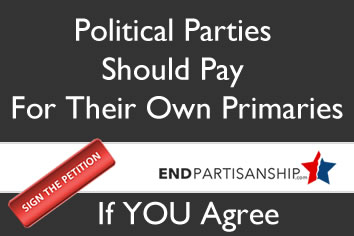How Democrats Abandoned Independents and Empowered the Tea Party

I’ve been digesting the coverage of the government shutdown and find the punditry a combination of incomplete and short-sighted.
Here’s a rough synopsis of most of what I’m reading: The GOP leadership is in a pickle because they cannot put a muzzle on the 80 tea party radicals in their caucus who play an uber-partisan game of chicken without fear of consequences because they come from safely gerrymandered districts.
There is a certain logic and coherency to this narrative. But, they never ask the obvious question: what happened to the broad “anti-partisanship” coalition that President Obama assembled back in 2008?
Think back to 2008. Candidate Barack Obama masterfully assembled the most dynamic and diverse coalition since the New Deal, a postmodern change movement that went beyond identity politics and traditional Democratic Party programmatics. He organized a broad spectrum of Americans around a vision of political/cultural transformation.He cultivated moderate Republicans turned off by the recklessness of the Bush administration and appealed directly to independents and millennials turned off by the partisan status quo and political parties altogether. Not since Ross Perot had a national candidate appealed so directly to American’s desire to change the culture of politics. And independents — 40% of the electorate by 2008 — were an essential component of this new coalition.
Obama’s strategy paid off. As John Heileman put it, “America elected their first independent President.”
Fast forward five years. Politics has never been more partisan. Our government lurches from crisis to crisis. Congress has an 11 percent approval rating, barely legislates, and cannot innovate. Leaving aside the obvious problem of the government shutdown, there has been no culture change in Washington. If anything, the partisan grip has tightened.
What happened? An important, largely untold story is the Democratic Party’s abandonment of independent voters and the systematic dismantling of the Obama coalition.
How President Obama and the Democratic Party pursued health care reform in 2009 directly empowered the tea party. Rather than put his new “change coalition” to work, , partisan operatives committed to the premise that only Democratic Party stakeholders would have a say in the health care conversation. Instead of nurturing and expanding the Obama change coalition, and recognizing that independents had a unique set of concerns about the political process, Reid and Pelosi said to independents, “thank you for your votes, but we will take it from here.” Music to the conservative movement’s ears.Fred Newman and Jackie Salit discussed this dynamic in September 2009 in a Talk/Talk conversation entitled “Obama’s Entanglements, or So What If He Is A Socialist?” Here is a snippet that I found particularly prescient (click here for the entire transcript – a great read):
Salit: I wrote a letter to David Brooks after the New York Times published his column “The Obama Slide” in which I criticized the automatic equation he makes between independents and the political center. He said Obama’s appeal to the left for support for health care reform has cost him support with independents. I wrote him that he was misinterpreting the polls. That when they look at the health care debate, one of the things that independents see is partisan politics as usual. They see Obama bogged down in that. And that’s a big part of what they’re responding to. Independents are conflicted about the role of government, that we know. But they don’t like the partisanship coming from all sides. And they’re afraid that the product to come out of such a process will be too partisan, too driven by special interests.
Newman: But the deeper issue is that independents are not led. Yes, everybody has conflicts about government. But the independent movement is not yet securely led by either the left of center or by the right.
Salit: Correct.
Newman: That’s part of what it means to be independent. And also to be so early in the process of emerging as a new political force. They’re susceptible to being all over the place.
Salit: And we’re not strong enough to do that.
Newman: Yes. And the left has not appreciated the significance of a coordinated and coherent struggle to influence the independent movement. And so, independents are vulnerable. To whom? Well, to the right. Why has the right been getting so much attention in this debate? Because if nothing else, they’re politically unified. And, they’ve had decades of being unified. They’ve always believed in cultivating their influence in the independent movement. Look at Pat Buchanan, who tried a full scale social conservative takeover of the independent movement. He failed – independents rejected him. But that doesn’t mean the GOP doesn’t work to control the independents. And as soon as they got their next chance, they grabbed it.
Grabbed it indeed. The conservative movement recognized that how the president and the Democratic Party was choosing to pursue health care reform gave them exactly what they needed to drive a wedge in Obama’s change coalition.
Many Democratic leaders liked this scenario; in fact, they invited it. Why? They prefer gridlock and government shutdown to empowering voters who are outside the Democratic Party. Just like many in the Republican Party, they look out for their own interests, not the country’s interest. And partisan self-interest is why 40 percent of Americans now identify as independents.The role that the Democratic Party played in dismantling an embryonic coalition that had the potential to transform politics is an important story. I’m convinced that the change coalition can be rebuilt with new leadership and under new circumstances.
It is, in my opinion, the best hope for our country. Otherwise we will continue to lurch from one crisis to another, fewer and fewer people will bother to participate at all, and we will fail to make progress on the crucial issues we face as a country. When that coalition comes back together, be it in 10 months or 10 years, it’s important to know our history.




